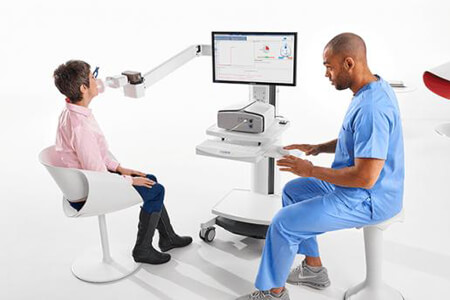
Chest pain and shortness of breath are symptoms that many people experience at some point, but recognising when they require medical attention is vital.
These symptoms can range from mild and temporary discomfort to warning signs of serious heart or lung issues. Acting quickly by consulting a specialist can prevent complications, ensure timely treatment, and provide peace of mind.
We’ll explore the potential causes of these symptoms, the warning signs that necessitate specialist care, and the diagnostic options available at SmartCare Diagnostics to help safeguard your health.
Recognising Concerning Symptoms
Chest pain and shortness of breath can stem from a wide range of underlying conditions. While some causes, like anxiety or mild acid reflux, may be harmless, others could signal life-threatening problems such as heart attacks or severe lung diseases.
Why it’s important to act quickly:
Timely diagnosis and treatment of these symptoms can make a significant difference in outcomes. Addressing the problem early reduces the risk of complications and helps ensure that any underlying condition is properly managed. At SmartCare Diagnostics, we focus on providing state-of-the-art diagnostics to empower patients by taking control of their heart and lung health.
Common Causes of Chest Pain and Shortness of Breath
Understanding the potential causes of these symptoms can help you determine when medical attention is needed.
Non-Urgent Causes:
- Anxiety or Stress: Emotional distress often manifests as a tight chest or shallow breathing.
- Acid Reflux (Heartburn): This common issue can cause discomfort that feels like chest pain.
- Muscle Strain: Overexertion during physical activity may cause temporary chest or breathing discomfort.
Serious Causes:
- Heart-Related Conditions: Angina (reduced blood flow to the heart), heart attack (blockage of blood supply to the heart), and pericarditis (inflammation of the tissue surrounding the heart).
- Lung-Related Conditions: Asthma, chronic obstructive pulmonary disease (COPD), or pulmonary embolism (blood clot in the lungs).
- Other Conditions: Pneumonia, severe lung infections, or aortic dissection (a tear in the wall of the aorta).
If symptoms persist, worsen, or appear without an identifiable cause, it’s essential to seek professional evaluation promptly. At SmartCare Diagnostics, we offer chest pain diagnostics and shortness of breath diagnostic testing.
When to See a Specialist for Chest Pain
It can be difficult to determine when to see a specialist for chest pain. Some of the symptoms to look out for include sudden, sharp, or severe chest pain, and pain that radiates to your arm, shoulder, jaw, or back. Tightness or pressure in the chest lasting more than a few minutes is another concerning sign, as well as chest pain accompanied by nausea, dizziness, fainting, or sweating.
While chest pain isn’t always heart-related, consulting a heart health specialist for chest pain is critical for accurate diagnosis and effective treatment.
Shortness of Breath that Needs Medical Attention
Shortness of breath can sometimes feel overwhelming, especially when it develops suddenly or doesn’t have an obvious cause. Be vigilant if you experience difficulty breathing while at rest or lying flat, persistent breathlessness following minimal exertion, or sudden shortness of breath with chest pain, lightheadedness, or fatigue.
Potential underlying causes of chest pain and shortness of breath include infections like pneumonia, symptoms of heart disease, or chronic respiratory issues such as asthma or COPD. Scheduling shortness of breath diagnostic testing at SmartCare Diagnostics can help identify and address the root cause.
The Importance of Diagnostic Testing
Accurate diagnosis is key to effectively managing chest pain and breathlessness. At SmartCare Diagnostics, we offer diagnostic tests for chest pain and breathlessness, including:
- Echocardiograms and Stress Tests: These assess your heart’s structure, function, and response to exertion.
- Lung Function Tests: Essential for identifying respiratory issues such as asthma or COPD.
- Imaging Tests: Chest X-rays and CT scans provide detailed views of the heart and lungs.
- Blood Tests: Can reveal markers of heart or lung disease, helping to pinpoint specific conditions.
Our commitment to advanced technology and compassionate care ensures early detection, which leads to better treatment outcomes.
Preventive Tips for Heart and Lung Health
While recognising symptoms and seeking timely care are crucial, proactive steps can help protect your heart and lung health.
Steps to safeguard your health:
- Routine health assessments help catch potential problems early.
- Focus on heart-healthy foods like fruits, vegetables, lean proteins, and whole grains.
- Engage in moderate exercise to improve circulation and lung capacity.
- Quit using tobacco, as it significantly increases your risk of heart and lung diseases.
- Practice relaxation techniques such as meditation, yoga, or deep breathing.
SmartCare Diagnostics also provides preventive screenings to help monitor your cardiovascular and respiratory health, even before symptoms appear.
Being mindful of symptoms like chest pain and shortness of breath is critical to preventing serious health issues. When in doubt, consulting a specialist ensures that you’re not leaving anything to chance. By acting early, you not only protect your heart and lung health but also gain the reassurance of knowing you’re on the right track.
If you’re experiencing troubling symptoms, don’t hesitate to seek help. At SmartCare Diagnostics, our comprehensive chest pain diagnostics and shortness of breath diagnostic testing are designed to provide clarity and confidence on your health journey.
Take the first step—schedule a consultation or screening with SmartCare Diagnostics today. Your heart and lung health deserve nothing less than expert care and attention.
Why wait or pay too much for diagnostic tests?